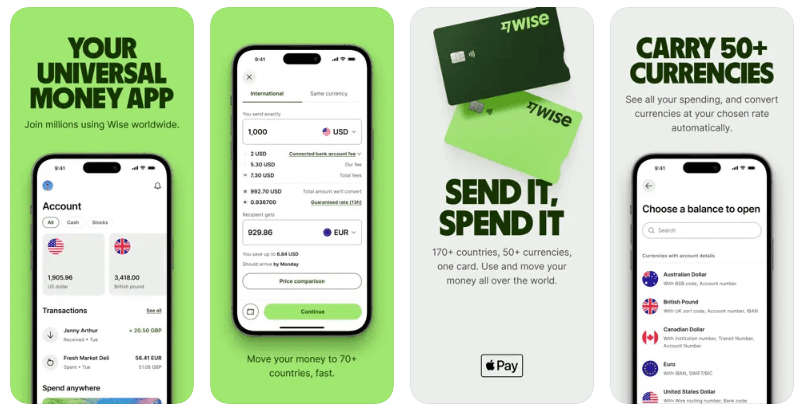Best PayPal Account Type for Freelancers (Complete Overview)
Looking for the best PayPal account type for freelancers? You may find that either the personal or business account might be worth it. Learn more here!

Sarah Li Cain is an expert freelance finance writer. A seasoned international traveler, she has written extensively on how to save money and look after your finances as a freelancer. She sometimes shares her knowledge right here on Wise, the smarter way to send money or get paid internationally.
How can you maximize your savings as a freelancer?
Now that you’re responsible for handling the finances, you’re going to face paying out of pocket for new expenses.
These include healthcare, bank fees (especially if you have international clients) and even invoicing software.
Now that some of the tax laws have changed in 2018, there are even more reasons to take advantage of the money-saving opportunities available.
Here are six essential money saving tips you can implement today.

You’re responsible for paying taxes since you’re technically your own employer.
You’ll need to pay estimated quarterly taxes and file a Schedule C with the IRS with your annual tax return, including gross income and business expenses. And depending on what your freelance business entity is, you may need to file different paperwork. It’s best to seek the advice of a professional to ensure you’re doing everything correctly.
Ensure that you pay estimated taxes on time or potentially face penalties. You can use a federal tax calculator to determine the correct amount to set aside. Many freelancers like myself use bookkeeping software that can calculate estimated taxes, although I use it to help me make sure I’m doing calculations correctly.
If you have multiple sources of income or have a complicated tax situation (like I did when I was a U.S. resident living in China), it’s best to consult a tax or legal professional. They could save money, especially if they can help you maximize deductions.
Furthermore, it pays to keep your paperwork organized. That way when you file your annual income taxes, you’re prepared. Paying estimated taxes also ensures that you won’t be penalized, costing you even more money.

No doubt you already know that you’re paying slightly more taxes as a freelancer than an employer. That’s because you may be paying more for Social Security. In addition, the more you make, the more you’ll pay because you’re in a higher tax bracket.
Since 2018, the government has made it more beneficial to be a pass-through entity. This includes sole proprietorships, partnerships, LLCs and S corporations in the eyes of the IRS. Instead of your entire income being considered personal income, you’re taxed directly on what the business pays you.
In addition, you may be able to take advantage of more deductions than someone who is “just a freelancer.” Business entities may be able to deduct up to 20% of the income they earn from the business.
If this sounds complicated, it can be. There are different rules and regulations depending on the state you reside in. Before making any decisions, talk to a tax or legal professional to see what is the best choice for you based on your goals, income and life situation.

When I worked with international clients, I had to worry about exchange rates and losing money to fees.
Prevent losing money due to exchange rates by quoting your rates in USD. That way, you’re essentially getting paid the same no matter what your client’s currency rate is.
Also, minimize as many fees as possible. Invoicing through places like PayPal may seem convenient, but you risk paying hefty service fees. I wish I had a service like Wise years ago when I started freelancing. They only charge you a small flat fee to transfer money and you get the real exchange rate, the one you see off xe.com. They've also built a borderless account so you can get paid in internationally without the conversion costs, and you can manage up to 40 different currencies at once. You can also create and send your invoices by using our downloadable free invoice templates, and use an independent contractor agreement template to make your work official.
Other ways to save on expenses include paying membership fees or subscription services annually or semi-annually. Most companies offer a discount for those who pay upfront. This can include insurance, web hosting and bookkeeping software. It also helps to go through an audit to see what you’re paying for and whether or not you really need them.

One of the biggest mistakes I made was not separating my finances when I started out freelancing.
For tax purposes, your personal income is different from your self-employed income. If you mix your finances together, you could be at risk of getting audited by the IRS, especially if you haven’t kept up to date with your bookkeeping or taxes. This is even more true if you are an LLC, partnership or an S-corporation.
Save yourself the heartache by opening a separate bank account. If you’re still a sole proprietor, opening a personal bank account should suffice for now, though there are many business bank accounts that allow sole proprietorships. If you’re worried about fees, there are many out there that don’t have any monthly fees and even offer you perks like free checks and ATM fee reimbursements.

Luckily for freelancers, there are a few organizations that help provide affordable healthcare.
NASE is an organization that provides support for those who are self-employed. One of those perks is affordable health insurance. Membership fees are a maximum of $120 and includes health insurance premiums based on your state and plan.
Freelancers Union also has affordable health insurance options. They group members together to keep the costs down. It’s free to join and they have a ton of other resources to help you thrive as a freelancer.
Another type of account you can consider is an HSA, or a health savings account. This is a place where you can put your pre-tax income to use specifically for qualified expenses. Another perk is that it’ll reduce your taxable income. Check with your healthcare plan provider to see if this is an option for you (not all plans qualify) and how it can help you in your overall health needs.

Putting money aside in retirement accounts is a great way to help you reduce taxable income.
You can contribute you pre-tax earnings into plans such a solo 401k or SEP IRA. Not only will you pay less in income taxes, but it’ll also help you earn interest in your money.
Those who want to maximize their contributions can opt for a solo 401k. Many freelancers also hire their spouse as an “employee” so they can essentially double their savings. Paying less taxes and earning interest on your money? Sounds like a win-win to me.
*Please see terms of use and product availability for your region or visit Wise fees and pricing for the most up to date pricing and fee information.
This publication is provided for general information purposes and does not constitute legal, tax or other professional advice from Wise Payments Limited or its subsidiaries and its affiliates, and it is not intended as a substitute for obtaining advice from a financial advisor or any other professional.
We make no representations, warranties or guarantees, whether expressed or implied, that the content in the publication is accurate, complete or up to date.

Looking for the best PayPal account type for freelancers? You may find that either the personal or business account might be worth it. Learn more here!

Embrace the flexibility of remote work with our guide on working remotely from another country. Gain insights into legal considerations and optimize your remote

Looking for a good time-clock app for your small business? No problem. Let's take a look at the best free and paid apps for you and your team.

Money-making apps consist of a few categories: Long-term freelancing apps, short-term task apps, delivery and taxi apps, and apps to sell your stuff.

1) Wise: Independent Contractor Account 2) Wonolo: Freelance Job Platform 3) TurboTax: Tax app 4) DoorDash: Deliver App 5) Fantastical Calendar: Free App

As long as you know how to market your skills and rates, you'll be able to profit quickly from Upwork. Let's jupm